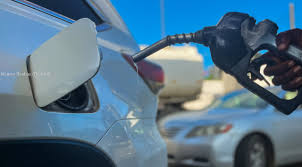Petroleum product marketers in Nigeria are expecting a possible drop in petrol pump prices this week, following a significant fall in international crude oil prices. This anticipated adjustment, according to industry sources, could begin from Monday, depending on decisions by major distributors like Dangote Petroleum Refinery, Nigerian National Petroleum Company Limited (NNPC), and other fuel importers.
Speaking on Sunday, the National Publicity Secretary of the Petroleum Products Retail Outlet Owners Association of Nigeria (PETROAN), Joseph Obele, said fuel marketers expect a new price regime to take effect as crude oil prices have now dropped below $70 per barrel. He said, “We anticipate there will be a new price regime from tomorrow. The new prices will come from everyone; from Dangote, NNPC and the rest. Let us wait till tomorrow.”
Petrol prices across Nigeria had previously risen to between ₦915 and ₦955 per litre in many parts of the country, with prices going as high as ₦980 in some parts of the far north. This followed a spike in crude prices to nearly $80 per barrel during the recent tension between Israel and Iran. However, as hostilities eased and a ceasefire was declared, global crude prices slumped, with Brent crude falling to about $67 and West Texas Intermediate (WTI) trading around $65.
Despite this drop, prices at filling stations have largely remained the same. In Abeokuta, Ogun State, retailers like MRS Oil, which sources products from the Dangote refinery, were still selling petrol at ₦935 per litre as of Sunday. Similarly, along the Lagos-Ibadan Expressway, stations such as SGR, Akiavic, and Sedabuk were seen selling between ₦915 and ₦925. NNPC’s outlet in Ibafo maintained a price of ₦925.
Depot owners and importers are gradually adjusting their prices in line with the current market. For example, Rainoil dropped its price from ₦900 to ₦880, NIPCO moved to ₦870, and A.A. Rano also offered petrol at ₦877. These adjustments reflect competition with the Dangote refinery, whose ex-depot price was ₦880 as of Sunday.
Speaking further on the issue, the spokesman of the Crude Oil Refinery Owners Association of Nigeria, Eche Idoko, said the full effect of falling crude oil prices may not be immediate. “It’s not rocket science. Until the current stock runs out, prices won’t change. But give it a week or two of crude price stability, and the market will respond,” he said.
Idoko also highlighted structural issues affecting petrol pricing in Nigeria. He explained that although refining in-country should help reduce prices, the reality is different because local refineries, including the Dangote refinery, are sourcing crude oil from international markets, particularly the United States. “We are still importing crude, so the benefit of local refining is not maximised,” he added.
Meanwhile, stakeholders in the downstream sector have urged the Federal Government to take urgent action to shield Nigerians from sharp fuel price increases. One suggestion involves pegging crude oil prices allocated to domestic refineries at affordable levels, irrespective of international market rates. This, they believe, would ensure cost-effective production and make petrol more affordable for Nigerians.
The National Vice President of the Independent Petroleum Marketers Association of Nigeria (IPMAN), Hammed Fashola, stressed that if the Israel-Iran conflict had worsened, petrol could have easily crossed the ₦1,000 per litre mark. He said the government should increase the supply of crude oil to the Dangote refinery and other local processors at discounted prices. “Crude meant for local consumption should be priced in a way that makes refined products cheaper for Nigerians,” Fashola said.
He also called on the Presidential Committee on the naira-for-crude initiative to set favourable rates for domestic refiners. The idea is to reduce Nigeria’s dependence on imported petroleum products and limit inflation driven by rising fuel costs.
In June, the price of PMS was adjusted upwards by several retailers after the Dangote refinery raised its ex-depot price from ₦825 to ₦880 per litre. MRS, for instance, moved its pump price in Lagos from ₦885 to ₦925. In the southeast, MRS sold petrol at ₦955, while the price was ₦935 in states like Ogun, Ondo, Osun, Ekiti, and Oyo. In the north, prices ranged from ₦945 to ₦955 depending on the region.
Marketers say the only way to stabilise prices sustainably is through consistent supply, better pricing mechanisms, and reduced dependency on imported crude. Until that is achieved, fluctuations in global oil prices will continue to affect the local petrol market.
